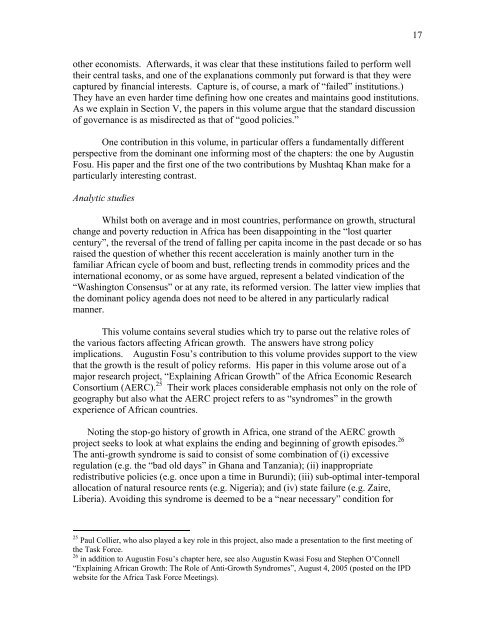Paper - Initiative for Policy Dialogue
Paper - Initiative for Policy Dialogue
Paper - Initiative for Policy Dialogue
You also want an ePaper? Increase the reach of your titles
YUMPU automatically turns print PDFs into web optimized ePapers that Google loves.
17<br />
other economists. Afterwards, it was clear that these institutions failed to per<strong>for</strong>m well<br />
their central tasks, and one of the explanations commonly put <strong>for</strong>ward is that they were<br />
captured by financial interests. Capture is, of course, a mark of “failed” institutions.)<br />
They have an even harder time defining how one creates and maintains good institutions.<br />
As we explain in Section V, the papers in this volume argue that the standard discussion<br />
of governance is as misdirected as that of “good policies.”<br />
One contribution in this volume, in particular offers a fundamentally different<br />
perspective from the dominant one in<strong>for</strong>ming most of the chapters: the one by Augustin<br />
Fosu. His paper and the first one of the two contributions by Mushtaq Khan make <strong>for</strong> a<br />
particularly interesting contrast.<br />
Analytic studies<br />
Whilst both on average and in most countries, per<strong>for</strong>mance on growth, structural<br />
change and poverty reduction in Africa has been disappointing in the “lost quarter<br />
century”, the reversal of the trend of falling per capita income in the past decade or so has<br />
raised the question of whether this recent acceleration is mainly another turn in the<br />
familiar African cycle of boom and bust, reflecting trends in commodity prices and the<br />
international economy, or as some have argued, represent a belated vindication of the<br />
“Washington Consensus” or at any rate, its re<strong>for</strong>med version. The latter view implies that<br />
the dominant policy agenda does not need to be altered in any particularly radical<br />
manner.<br />
This volume contains several studies which try to parse out the relative roles of<br />
the various factors affecting African growth. The answers have strong policy<br />
implications. Augustin Fosu’s contribution to this volume provides support to the view<br />
that the growth is the result of policy re<strong>for</strong>ms. His paper in this volume arose out of a<br />
major research project, “Explaining African Growth” of the Africa Economic Research<br />
Consortium (AERC). 25 Their work places considerable emphasis not only on the role of<br />
geography but also what the AERC project refers to as “syndromes” in the growth<br />
experience of African countries.<br />
Noting the stop-go history of growth in Africa, one strand of the AERC growth<br />
project seeks to look at what explains the ending and beginning of growth episodes. 26<br />
The anti-growth syndrome is said to consist of some combination of (i) excessive<br />
regulation (e.g. the “bad old days” in Ghana and Tanzania); (ii) inappropriate<br />
redistributive policies (e.g. once upon a time in Burundi); (iii) sub-optimal inter-temporal<br />
allocation of natural resource rents (e.g. Nigeria); and (iv) state failure (e.g. Zaire,<br />
Liberia). Avoiding this syndrome is deemed to be a “near necessary” condition <strong>for</strong><br />
25 Paul Collier, who also played a key role in this project, also made a presentation to the first meeting of<br />
the Task Force.<br />
26 in addition to Augustin Fosu’s chapter here, see also Augustin Kwasi Fosu and Stephen O’Connell<br />
“Explaining African Growth: The Role of Anti-Growth Syndromes”, August 4, 2005 (posted on the IPD<br />
website <strong>for</strong> the Africa Task Force Meetings).














